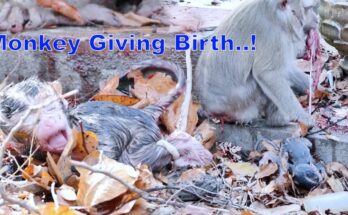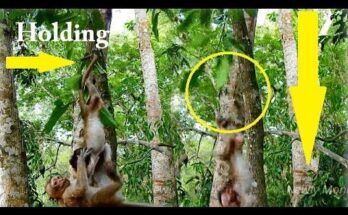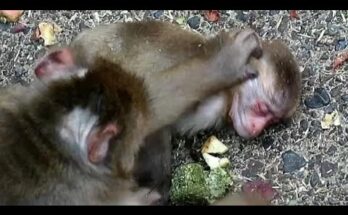The midday calm shattered into a storm of shrieks when Mom Gonda erupted in a sudden, terrifying attack on little Conga. What started as a routine playtime in the shaded clearing quickly spiraled into chaos — frantic rustling, scuffled footsteps and a high-pitched wail that tugged at every heart nearby. Conga, still too small to fend for himself, scrambled and whimpered as Gonda’s anger rained down: a flurry of pushes, sharp snaps and frantic movements that left the tiny monkey reeling and trembling.
Witnesses froze, helpless and horrified. Gonda’s face, usually soft with the tired warmth of motherhood, was twisted in a fierce, almost unrecognizable expression. Her quick, aggressive motions seemed fueled by something deeper than anger — a raw fear or a desperate confusion that made her lash out at the one she should protect most. Conga’s eyes, wide and wet, reflected shock and pain; tiny limbs that moments earlier had been exploring the world were now curled close to his body for shelter.
Neighbors tried to intervene, forming a cautious ring and calling out in urgent, pleading tones, but Gonda’s distress was a wall nobody could climb. The spectacle was heartbreaking: a mother’s love turned volatile, a terrified infant left to bear the brunt. When the fighting finally subsided, Conga lay curled on the leaf-strewn ground, licking a sore spot and trembling with each breath. His cries were softer now, each one a fragile plea for comfort that seemed to float away into the still air.
This scene is more than just a single cruel incident — it’s a painful mirror for how fragile family bonds can become when fear, stress or misunderstanding take root. Conga’s small body held visible marks of the encounter, but it was the invisible wounds that cut the deepest: the loss of trust, the trembling hesitation when reaching for a mother’s touch, the sudden flinch at loud noises. For Conga, the world had changed in an instant from a trusting playground to a place where safety felt uncertain.
Yet amidst the sorrow, there is a thread of hope. Caring members of the group circled Conga, offering gentle grooming and soft, coaxing sounds designed to soothe. An older female — known for her calm — settled close and wrapped a winglike arm around the trembling baby, giving him space to breathe and begin the slow work of recovery. Small acts of tenderness became a balm: a careful inspection for injuries, the sharing of food, and quiet lullabies of soft chatter. These gestures remind us that even when things break, community can begin the work of mending.
Conga’s path forward will be gradual. He’ll need patient reassurance to rebuild the trust that was so quickly broken, and Gonda will need time and support to find a steadier, gentler place. This painful episode serves as both a caution and a call: to notice signs of distress early, to intervene with compassion, and to stand together when the most vulnerable among us need protection. For now, the clearing holds a hush of sadness — but it also holds the promise that, with care, Conga can heal and learn to play again in the arms of those who truly love him.


